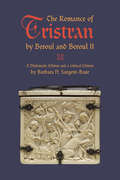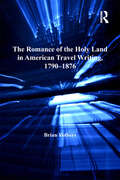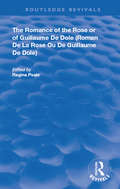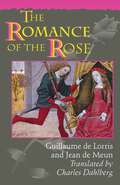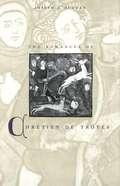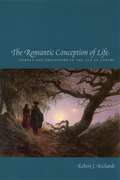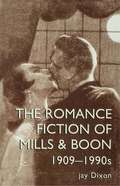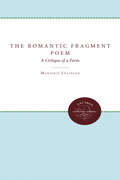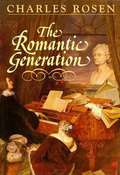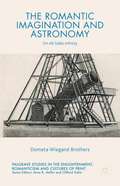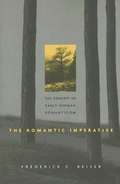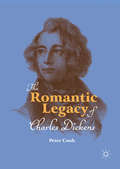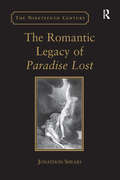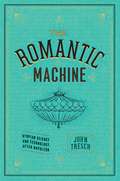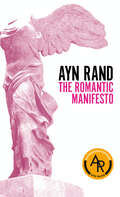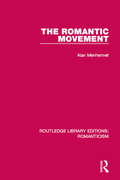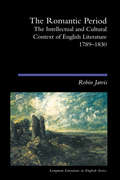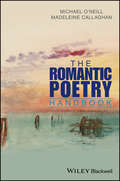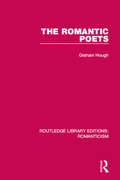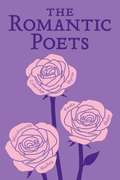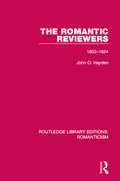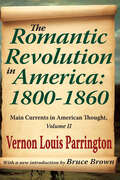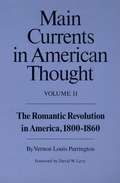- Table View
- List View
The Romance of Tristran by Beroul and Beroul II
by Barbara N. Sargent-BaurWritten in the late-twelfth century, the Old French Romance of Tristran by Beroul is one of the earliest surviving versions of the story of Tristran and Iseut. Preserved in only one manuscript, the poem records the tragic tale that became one of the most popular themes of medieval literature, in several languages. This volume is a comprehensive and up-to-date presentation of the story, including the first ever diplomatic edition of the text, replicating the exact state of the original manuscript. It also contains a new critical edition, complemented by extensive notes and a brief analytic preface.Edited by noted medievalist Barbara N. Sargent-Baur, The Romance of Tristran by Beroul and Beroul II: A Diplomatic Edition and a Critical Edition will be an essential resource for specialists interested in the study of this important text. An English translation of the Old French text appears in The Romance of Tristran by Beroul and Beroul II: Student Edition and English Translation.
The Romance of the Holy Land in American Travel Writing, 1790–1876
by Brian YothersThis book is the first to engage with the full range of American travel writing about nineteenth-century Ottoman Palestine, and the first to acknowledge the influence of the late-eighteenth-century Barbary captivity narrative on nineteenth-century travel writing about the Middle East. Brian Yothers argues that American travel writing about the Holy Land forms a coherent, if greatly varied, tradition, which can only be fully understood when works by major writers such as Twain and Melville are studied alongside missionary accounts, captivity narratives, chronicles of religious pilgrimages, and travel writing in the genteel tradition. Yothers also examines works by lesser-known authors such as Bayard Taylor, John Lloyd Stephens, and Clorinda Minor, demonstrating that American travel writing is marked by a profound intertextuality with the Hebrew and Christian scriptures and with British and continental travel narratives about the Holy Land. His concluding chapter on Melville's Clarel shows how Melville's poem provides an incisive critique of the nascent imperial discourse discernible in the American texts with which it is in dialogue.
The Romance of the Rose or of Guillaume de Dole: The Romance Of The Rose Or Of Guillaume De Dole ( Roman De La Rose Ou De Guillaume De Dole ) (Routledge Revivals #92)
by Regina PsakiPublished in 1995: The author of at least two noteworthy romances of the early thirteenth century, Le Roman de la Rose or Guillaume de Dole and L'Escoufle (The Kite), as well as Le Lai de l'Ombre, Jean Renart is today recognized as the most accomplished practitioner of the "realistic romance" in Old French literature.
The Romance of the Rose: Third Edition
by Guillaume de Lorris Jean de MeunMany English-speaking readers of the Roman de la rose, the famous dream allegory of the thirteenth century, have come to rely on Charles Dahlberg's elegant and precise translation of the Old French text. His line-by-line rendering in contemporary English is available again, this time in a third edition with an updated critical apparatus. Readers at all levels can continue to deepen their understanding of this rich tale about the Lover and his quest--against the admonishments of Reason and the obstacles set by Jealousy and Resistance--to pluck the fair Rose in the Enchanted Garden.The original introduction by Dahlberg remains an excellent overview of the work, covering such topics as the iconographic significance of the imagery and the use of irony in developing the central theme of love. His new preface reviews selected scholarship through 1990, which examines, for example, the sources and influences of the work, the two authors, the nature of the allegorical narrative as a genre, the use of first person, and the poem's early reception. The new bibliographic material incorporates that of the earlier editions. The sixty-four miniature illustrations from thirteenth-and fifteenth-century manuscripts are retained, as are the notes keyed to the Langlois edition, on which the translation is based.
The Romances of Chrétien de Troyes
by Joseph J. DugganThis book has a double audience: the general reader interested in literature of the Middle Ages who is looking for an account of Chrétien de Troyes's romances set in the context of their period and the specialist in medieval French literature.
The Romantic Conception of Life: Science and Philosophy in the Age of Goethe
by Robert J. Richards"All art should become science and all science art; poetry and philosophy should be made one." Friedrich Schlegel's words perfectly capture the project of the German Romantics, who believed that the aesthetic approaches of art and literature could reveal patterns and meaning in nature that couldn't be uncovered through rationalistic philosophy and science alone. In this wide-ranging work, Robert J. Richards shows how the Romantic conception of the world influenced (and was influenced by) both the lives of the people who held it and the development of nineteenth-century science. Integrating Romantic literature, science, and philosophy with an intimate knowledge of the individuals involved—from Goethe and the brothers Schlegel to Humboldt and Friedrich and Caroline Schelling—Richards demonstrates how their tempestuous lives shaped their ideas as profoundly as their intellectual and cultural heritage. He focuses especially on how Romantic concepts of the self, as well as aesthetic and moral considerations—all tempered by personal relationships—altered scientific representations of nature. Although historians have long considered Romanticism at best a minor tributary to scientific thought, Richards moves it to the center of the main currents of nineteenth-century biology, culminating in the conception of nature that underlies Darwin's evolutionary theory. Uniting the personal and poetic aspects of philosophy and science in a way that the German Romantics themselves would have honored, The Romantic Conception of Life alters how we look at Romanticism and nineteenth-century biology.
The Romantic Crowd
by Mary FaircloughIn the long eighteenth century, sympathy was understood not just as an emotional bond, but also as a physiological force, through which disruption in one part of the body produces instantaneous disruption in another. Building on this theory, Romantic writers explored sympathy as a disruptive social phenomenon, which functioned to spread disorder between individuals and even across nations like a 'contagion'. It thus accounted for the instinctive behaviour of people swept up in a crowd. During this era sympathy assumed a controversial political significance, as it came to be associated with both riotous political protest and the diffusion of information through the press. Mary Fairclough reads Edmund Burke, Mary Wollstonecraft, William Godwin, John Thelwall, William Hazlitt and Thomas De Quincey alongside contemporary political, medical and philosophical discourse. Many of their central questions about crowd behaviour still remain to be answered by the modern discourse of collective psychology.
The Romantic Fiction Of Mills & Boon, 1909-1995 (Women's and Gender History)
by Dixon, Jay Jay Dixon.This study to analyzes romantic fiction's depiction of women as part of the broader history of ideas about women.; Given the success of the Mills & Boon romance, their portrayal of subjects like sex, love, marriage, class, motherhood and femineity are important cultural barometers and make interesting study.; The author shows how all these themes have an historical trajectory and how these novels have come to reflect feminist concerns.; Based on a study of over 1000 Mills & Boon romances the book provides analysis of plot types and shows how these have changed in response to women's own changing position within society.
The Romantic Fragment Poem: A Critique of a Form
by Marjorie LevinsonThe fragment poem, long regarded as a peculiarly Romantic phenomenon, has never been examined outside the context of thematic and biographical criticism. By submitting the unfinished poems of the English Romantics to both a genetic investigation and a reception study, Marjorie Levinson defines the fragment's formal character at various moments in its historical career. She suggests that the formal determinancy of these works, hence their expressive or semantic affinities, is a function of historical conditions and projections.The English Romantic fragment poems share not so much a particular mode of production as a myth of production. Levinson pries apart these two dimensions and analyzes each independently to consider their relationship. By reconstructing the contemporary reception of such works as Wordsworth's "Nutting," Coleridge's "Christabel" and "Kubla Khan," Shelley's "Julian and Maddalo," and Keats's Hyperion fragments, and juxtaposing this model against dominant twentieth-century critical paradigms, Levinson discriminates layers, phases, and kinds of intentionality in the poems and considers the ideological implications of this diversity.This study is the first to investigate the English Romantic fragment poem by identifying the assumptions -- contemporary and belated -- that govern interpretative procedures. In a substantial summary chapter, Levinson reflects upon the meaning and effects of these assumptions with respect to the facts and fictions of literary production in the period and to the processes of canon formation.Originally published in 1986.A UNC Press Enduring Edition -- UNC Press Enduring Editions use the latest in digital technology to make available again books from our distinguished backlist that were previously out of print. These editions are published unaltered from the original, and are presented in affordable paperback formats, bringing readers both historical and cultural value.
The Romantic Generation
by Charles RosenWhat Charles Rosen's celebrated book The Classical Style did for music of the Classical period, this new, much-awaited volume brilliantly does for the Romantic era. An exhilarating exploration of the musical language, forms, and styles of the Romantic period, it captures the spirit that enlivened a generation of composers and musicians, and in doing so it conveys the very sense of Romantic music. In readings uniquely informed by his performing experience, Rosen offers consistently acute and thoroughly engaging analyses of works by Schubert, Schumann, Mendelssohn, Bellini, Liszt, and Berlioz, and he presents a new view of Chopin as a master of polyphony and large-scale form. He adeptly integrates his observations on the music with reflections on the art, literature, drama, and philosophy of the time, and thus shows us the major figures of Romantic music within their intellectual and cultural context. Rosen covers a remarkably broad range of music history and considers the importance to nineteenth-century music of other cultural developments: the art of landscape, a changed approach to the sacred, the literary fragment as a Romantic art form. He sheds new light on the musical sensibilities of each composer, studies the important genres from nocturnes and songs to symphonies and operas, explains musical principles such as the relation between a musical idea and its realization in sound and the interplay between music and text, and traces the origins of musical ideas prevalent in the Romantic period. Rich with striking descriptions and telling analogies, Rosen's overview of Romantic music is an accomplishment without parallel in the literature, a consummate performance by a master pianist and music historian.
The Romantic Imagination and Astronomy
by Dometa Wiegand BrothersThe Romantic Imagination and Astronomy is the first book to reconstruct the history of the science of astronomy and its importance to the Romantic imagination in exploration and colonization by imperial England. It examines how the science of astronomy in exploration and discovery, from Edmund Halley and William Herschel to Captain Cook, changed the world by tying the 'pure' science of astronomy to the practical, commercial, and martial aims of navigation for the maritime nation of England. It demonstrates that the same 'pure' science of astronomy also fueled the Romantic poetic imagination, influencing the evolution of form and content of poetry — from formation of the greater Romantic lyric of Barbauld and Coleridge, to the fantastic narratives of Keats and Shelley.
The Romantic Imperative
by Frederick C. BeiserThe Early Romantics met resistance from artists and academics alike in part because they defied the conventional wisdom that philosophy and the arts must be kept separate. Indeed, as the literary component of Romanticism has been studied and celebrated in recent years, its philosophical aspect has receded from view. This book, by one of the most respected scholars of the Romantic era, offers an explanation of Romanticism that not only restores but enhances understanding of the movement's origins, development, aims, and accomplishments--and of its continuing relevance. Poetry is in fact the general ideal of the Romantics, Frederick Beiser tells us, but only if poetry is understood not just narrowly as poems but more broadly as things made by humans. Seen in this way, poetry becomes a revolutionary ideal that demanded--and still demands--that we transform not only literature and criticism but all the arts and sciences, that we break down the barriers between art and life, so that the world itself becomes "romanticized. " Romanticism, in the view Beiser opens to us, does not conform to the contemporary division of labor in our universities and colleges; it requires a multifaceted approach of just the sort outlined in this book.
The Romantic Imperative: The Concept of Early German Romanticism
by Frederick C. BeiserThis study restores and enhances the philosophical aspect of early German Romanticism, offering an understanding of the movement's origins, development, aims and accomplishments.
The Romantic Legacy of Charles Dickens
by Peter CookThis book explores the relationship between Dickens and canonical Romantic authors: Blake, Wordsworth, Coleridge, Byron, Percy and Mary Shelley, and Keats. Addressing a significant gap in Dickens studies, four topics are identified: Childhood, Time, Progress, and Outsiders, which together constitute the main aspects of Dickens’s debt to the Romantics. Through close readings of key Romantic texts, and eight of Dickens’s novels, Peter Cook investigates how Dickens utilizes Romantic tropes to express his responses to the exponential growth of post-revolutionary industrial, technological culture and its effects on personal life and relationships. In this close study of Dickensian Romanticism, Cook demonstrates the enduring relevance of Dickens and the Romantics to contemporary culture.
The Romantic Legacy of Paradise Lost: Reading against the Grain (The Nineteenth Century Series)
by Jonathon ShearsThe Romantic Legacy of Paradise Lost offers a new critical insight into the relationship between Milton and the Romantic poets. Beginning with a discussion of the role that seventeenth and eighteenth-century writers like Dryden, Johnson and Burke played in formulating the political and spiritual mythology that grew up around Milton, Shears devotes a chapter to each of the major Romantic poets, contextualizing their 'misreadings' of Milton within a range of historical, aesthetic, and theoretical contexts and discourses. By tackling the vexed issue of whether Paradise Lost by its nature makes available and encourages alternate readings or whether misreadings are imposed on the poem from without, Shears argues that the Romantic inclination towards fragmentation and a polysemous aesthetic leads to disrupted readings of Paradise Lost that obscure the theme, or warp the 'grain', of the poem. Shears concludes by examining the ways in which the legacy of Romantic misreading continues to shape critical responses to Milton's epic.
The Romantic Machine: Utopian Science and Technology after Napolean
by John TreschIn the years immediately following Napoleon’s defeat, French thinkers in all fields set their minds to the problem of how to recover from the long upheavals that had been set into motion by the French Revolution. Many challenged the Enlightenment’s emphasis on mechanics and questioned the rising power of machines, seeking a return to the organic unity of an earlier age and triggering the artistic and philosophical movement of romanticism. Previous scholars have viewed romanticism and industrialization in opposition, but in this groundbreaking volume John Tresch reveals how thoroughly entwined science and the arts were in early nineteenth-century France and how they worked together to unite a fractured society. Focusing on a set of celebrated technologies, including steam engines, electromagnetic and geophysical instruments, early photography, and mass-scale printing, Tresch looks at how new conceptions of energy, instrumentality, and association fueled such diverse developments as fantastic literature, popular astronomy, grand opera, positivism, utopian socialism, and the Revolution of 1848. He shows that those who attempted to fuse organicism and mechanism in various ways, including Alexander von Humboldt and Auguste Comte, charted a road not taken that resonates today. Essential reading for historians of science, intellectual and cultural historians of Europe, and literary and art historians, The Romantic Machine is poised to profoundly alter our understanding of the scientific and cultural landscape of the early nineteenth century.
The Romantic Manifesto
by Ayn RandIn this beautifully written and brilliantly reasoned book, Ayn Rand throws a new light on the nature of art and its purpose in human life. Once again Miss Rand eloquently demonstrates her refusal to let popular catchwords and conventional ideas stand between her and the truth as she has discovered it. The Romantic Manifesto takes its place beside The Fountainhead as one of the most important achievements of our time.
The Romantic Movement (Routledge Library Editions: Romanticism #22)
by Alan MenhennetFirst published in 1981. This study concentrates on the exponents of the central period of German Romanticism, regarding as characteristic the mode in which the poet’s self becomes active only in response to external stimuli, most notably those of landscape. The author traces the main strands of thought and interests that preoccupy Romantic writers; the revolutionary attitude that is yet differentiated from that of writers like Byron by the lack of emphasis on individualism, the dualism of the bourgeois world and the ‘inner self’, the interest in language as an agency for the regeneration of the German spirit, and the concentration on folk-themes and the idea of Wanderung. This title will be of interest to students of literature.
The Romantic Period: The Intellectual & Cultural Context of English Literature 1789-1830 (Longman Literature In English Series)
by Robin JarvisThe Romantic Period was one of the most exciting periods in English literary history. This book provides a comprehensive and up-to-date account of the intellectual and cultural background to Romantic literature. It is accessibly written and avoids theoretical jargon, providing a solid foundation for students to make their own sense of the poetry, fiction and other creative writing that emerged as part of the Romantic literary tradition.
The Romantic Poetry Handbook (Wiley Blackwell Literature Handbooks)
by Michael O'Neill Madeleine CallaghanAn absorbing survey of poetry written in one of the most revolutionary eras in the history of British literature This comprehensive survey of British Romantic poetry explores the work of six poets whose names are most closely associated with the Romantic era—Wordsworth, Coleridge, Blake, Keats, Byron, and Shelley—as well as works by other significant but less widely studied poets such as Leigh Hunt, Charlotte Smith, Felicia Hemans, and Letitia Elizabeth Landon. Along with its exceptional coverage, the volume is alert to relevant contexts, and opens up ways of understanding Romantic poetry. The Romantic Poetry Handbook encompasses the entire breadth of the Romantic Movement, beginning with Anna Laetitia Barbauld and running through to Thomas Lovell Beddoes and John Clare. In its central section ‘Readings’ it explores tensions, change, and continuity within the Romantic Movement, and examines a wide range of individual poems and poets through sensitive, attentive and accessible analyses. In addition, the authors provide a full introduction, a detailed historical and cultural timeline, biographies of the poets whose works are featured in the “Readings” section, and a helpful guide to further reading. The Romantic Poetry Handbook is an ideal text for undergraduate and postgraduate study of British Romantic poetry. It also will appeal to every reader with an interest in the Romantics and in poetry generally.
The Romantic Poets (Routledge Library Editions: Romanticism #17)
by Graham HoughFirst published in 1953. At its best, Romantic poetry combined the creative freedom of a dream with some of the deepest facts of human experience. In this critical survey, Professor Hough examines individually the poetry of Gray, Wordsworth, Coleridge, Byron, Shelley and Keats. He sets their work firmly in the context of the major events and preoccupations of the age, clarifying the origins and growth of a poetry that emerged so swiftly and differed so radically from the Augustan age that preceded it. He asserts the importance of the Romantic experience to the tradition of literature, and its significance to the reader of today.
The Romantic Poets (Wordsworth Classics)
by Samuel Taylor Coleridge John Keats William Blake William Wordsworth Percy Bysshe Shelley George Gordon Lord ByronRomanticism gained traction in the late 1700s as writers moved away from the intellectualism of the Enlightenment and toward more emotional and natural themes. The major works of the movement’s five most famous poets--William Wordsworth, George Gordon Byron, Percy Bysshe Shelley, Samuel Taylor Coleridge, and John Keats--are represented in this handsome Word Cloud Classics volume, The Romantic Poets. One of the largest and most influential artistic movements in history, Romanticism valued intuition and pastoralism, and its themes are well represented in the verse of its stars. Lexile code: NP
The Romantic Reviewers: 1802-1824 (Routledge Library Editions: Romanticism #15)
by John O. HaydenFirst published in 1969. This study of literary reviewing in the early nineteenth century is concerned with contemporary criticism of the works of the major Romantic poets – Wordsworth, Coleridge, Byron, Shelley and Keats – and of seven other notable Romantic writers including Hazlitt, Lamb and Scott. The criticism of all works in prose and verse, excluding novels, published by these writers between 1802 and 1824 is described and analysed. This study also considers the policies and practices of the reviews, and their political, religious and moral attitudes in literary matters. This title will be of interest to students of literature.
The Romantic Revolution in America: Main Currents in American Thought
by Vernon Louis ParringtonThe development of literature between 1800 and 1860 in the United States was heavily influenced by two wars. The War of 1812 hastened the development of nineteenth-century ideals, and the Civil War uprooted certain growths of those vigorous years. The half century between these dramatic episodes was a period of extravagant vigor, the final outcome being the emergence of a new middle class.Parrington argues that America was becoming a new world with undreamed potential. This new era was no longer content with the ways of a founding generation. The older America of colonial days had been static, rationalistic, inclined to pessimism, and fearful of innovation. During the years between the Peace of Paris (1763) and the end of the War of 1812, older America was dying. The America that emerged, which is the focal point of this volume, was a shifting, restless world, eager to better itself, bent on finding easier roads to wealth than the plodding path of natural increase.The culture of this period also changed. Formal biographies written in this period often gave way to eulogy; it was believed that a writer was under obligation to speak well of the dead. Consequently, scarcely a single commentary of the times can be trusted, and the critic is reduced to patching together his account out of scanty odds and ends. A new introduction by Bruce Brown highlights the life of Vernon Louis Parrington and explains the importance of this second volume in the Pulitzer Prize-winning study.
The Romantic Revolution in America: an Interpretation of American Literature from the Beginnings to 1920 )
by Vernon Louis ParringtonFirst published in 1927, The Romantic Revolution in America: 1800-1860, is the second volume in Vernon Louis Parrington's widely acclaimed study of the development of American thinking entitled Main Currents in American Thought, An Interpretation of American Literature from the Beginnings to 1920. Parrington examines the writings of influential American thinkers from Jefferson to Lincoln in each section of the growing united States. His thesis is that the economic fluidity that prevailed in America after 1800 inspired in each geographical section of the country a version of a hopeful and confident romantic utopianism that ultimately proved to be self-defeating. It created federally protected money grubbing capitalists rather than a future of transcendent democratic fruitfulness. He is today regarded as the leading figure in the school of intellectuals known as "progressive historians." A key section of his introduction reads as follows: The older America of colonial days had been static, rationalistic, inclined to pessimism, fearful of innovation, tenacious of the customary. It conceived of human nature as evil, and accounting men incurably wicked, it opened no doors to Utopian dreams of a golden future. . . During the thirty-odd years between the Peace of Paris and the end of the War of 1812 that older America was dying. The America that succeeded was a shifting, restless world, youthfully optimistic, eager to better itself, bent on finding easier roads to wealth than the plodding path of natural increase. It conceived of human nature as acquisitive, and accounting acquisitiveness a cardinal virtue, it set out to inquire what opportunities awaited it in the unexploited resources of the continent.
